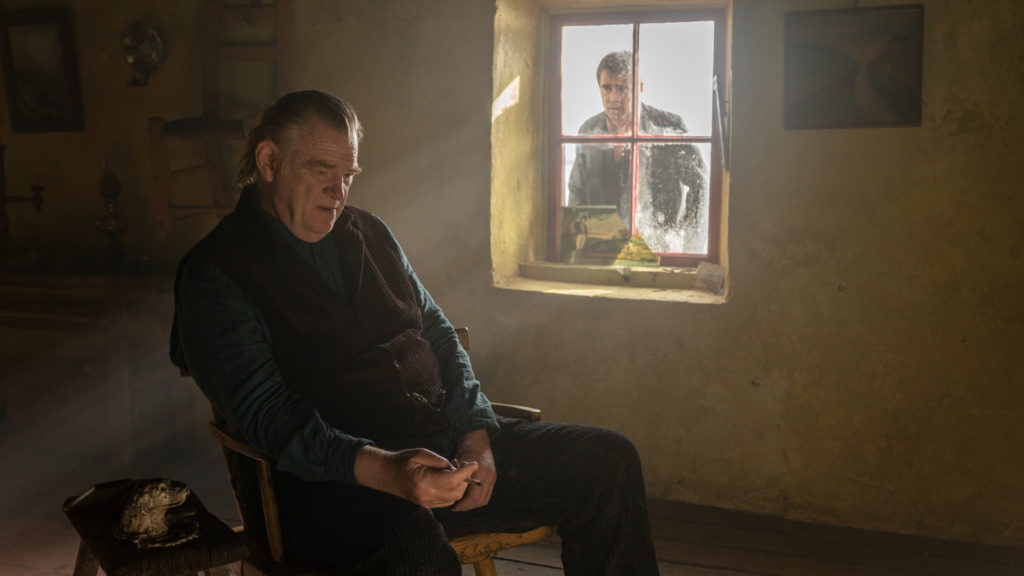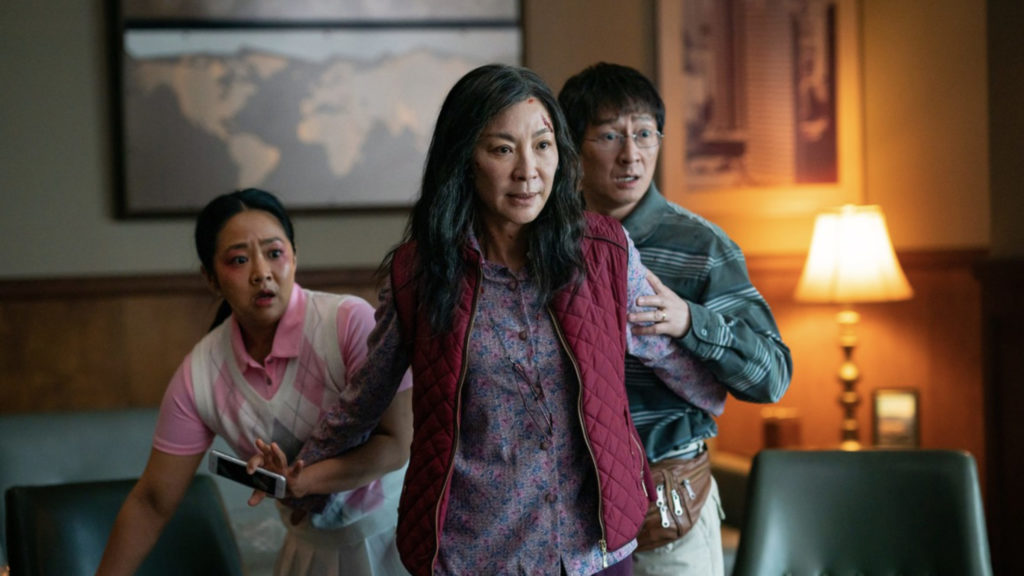The biggest films of 2022 share little aesthetic continuity — there were candy-bright superhero epics and whimsical black comedies, and desaturated war movies — but as we were considering them collectively, we were struck by common themes.
These are stories about a civilizational crisis of confidence, a gnawing worry that greatness is nothing more than a tool for bullies, that parents can pass nothing to their children. While some films offer hope that icons can be humbled and come through it more human and heroic, others are haunted by specters, prompting the biggest question: How do we use our time here? To that end, we decided to look at films in pairs, seeing what light they shed on each other.
‘RRR’ / ‘Black Panther: Wakanda Forever’
Hannah Long: “RRR” is a movie for people who think “The Patriot” was too nice to the British and could have used more musical numbers. The movie never lets pesky little things like historical accuracy or the laws of physics interfere with spectacle and emotion.
“Black Panther: Wakanda Forever” sounds similar to the Tollywood epic on paper: heroes fight colonial oppressors through CGI-enhanced superfeats. But there’s a sharp contrast between “RRR’s” bonkers overconfidence and uncomplicated ambition and “Black Panther’s” clutter of characters mired in grief, self-doubt, and vengefulness. The latter franchise can’t avoid the fact that it’s devoted to mourning its late leading man (Chadwick Boseman, who died of cancer in 2020), but the uncertainty of heroic succession at the end of the story leaves us unsettled.
Anxiety over power — the use of it, the abuse of it, the conveying or surrendering of it — permeates this year’s slate of films. Consider the “en vogue” eat-the-rich genre.
‘Triangle of Sadness’ / ‘The Menu’
Joseph Joyce: Oscar nominee “Triangle of Sadness” and “The Menu” are an easy pair. As Hannah pointed out, the most common theme this year was “eat the rich,” and these two were flagships of that particular fleet. Thankfully, that theme was not as literal as the latter’s title implies. The films both even finish on remote islands, where the themes have the legroom to stretch and get as broad as possible. But while similar, they differ on exactly who to blame.
“Triangle of Sadness” sees our current class caste as primal instinct. When given a chance to start over, the shipwrecked crew instead recreates the system. The totem pole has been restacked, but the same base greed stacks us just the same.
“The Menu” also gives a flinty squint at the rich but keeps the blame closer to home. Ralph Fiennes’ temperamental chef impugns his wealthy clientele for corrupting his art, but knows it’s his own fault for trying to impress those without taste. Fat cats are always going to be fat, but it doesn’t mean you have to rub their belly.
‘Tár’ / ‘Banshees of Inisherin’
Hannah Long: The emotional fallout of isolation and rejection within a community can be devastating, and it’s represented by these films in a ghoulish, deathly fashion — ghosts and banshees. “Cancel culture,” like “wokeness,” has become a bit of a content-free term these days.
Films like “Tár” and “Banshees” are about “cancellations” of a sort, but by putting flesh on the bones of allegory, they help us push beyond stale partisan debates to bigger questions, like: Can a striving for greatness ever leave the “little people” unscathed? Can we ever banish the ghosts of our unloved neighbors?

‘The Batman’ / ‘Decision to Leave’
Joseph Joyce: In a world of Marvel cinematic overload, there are more obvious films to compare with “The Batman.” But Park Chan-wook’s eerie romance thriller makes for an odd but effective pairing: It’s like fish with white wine, or pineapple on pizza.
Both feature detectives (one dressed slightly less like a bat) who are abstracted from the crime they solve. Robert Pattinson’s Batman is more interested in vengeance than justice, while for homicide Detective Jang Hae-joon, solving the case is primarily about satisfying his ego. They see themselves as above sin, which makes them good at their jobs but not necessarily good at humanity.
It takes a literal dalliance with the criminal element to bring them back down to earth. Batman’s schoolboy crush on Catwoman invests him in her own quest for revenge. But by gazing into this vengeful mirror, he can’t help but see the beam in his own eye. Everyone has suffered, and merely punishing those responsible won’t salve or solve anything.
Detective Jang is finally put on the backfoot when he starts to fall in love with a murder suspect, and his neat line between good and evil is smeared irrevocably. This new empathy helps him solve more cases, but such success is more pyrrhic when you now understand the love that makes people ruin their lives. Love is the great leveler for both of our detectives. Sometimes the only way to be a part of a solution is to remember that you are part of the problem, that problem being humanity.
‘The Fabelmans’ / ‘Nope’
Hannah Long: “You do what your heart says you have to. Because you don’t owe anyone your life.” So says Steven Spielberg’s mom, fictionalized here as “Mitzi Fabelman.” She’s not blind to the wreckage that this creed will make of their family life, but the call of the 1960s — just around the corner — is too strong to resist.
What’s interesting about “The Fabelmans,” though, is its ambivalence about following your dreams. Mitzi is the more charismatic parent, but her solid husband, Burt, gets to voice a message just as important: “You can’t just love something. You also have to take care of it.”
Similarly, “Nope,” Jordan Peele’s latest offering, treats artistic ambition, and the obsessive control it demands, with leeriness. Cameras are enchanted pools, sucking us in through our desire for fame and power. Wisdom is in looking away, much like Indiana Jones advises Marion Ravenwood. Reverence for the uncontrollable is the only way to survive.
‘Ambulance’ / ‘Broker’
Joseph Joyce: Perhaps the only way to test auteur theory is to give two directors the same script and see how they diverge. That nearly happens with Michael Bay’s “Ambulance” and Hirokazu Kore-eda’s “Broker.” Each involves a crime gone wrong, a bank robbery in the former and human trafficking in the latter. And each has the police in hot pursuit most of the time.
Bay dresses the plot in a firework show of explosions and carnage, proverbially known as “Bay-hem.” It’s spectacular entertainment, with drone shots plunging off Los Angeles skyscrapers. It’s like getting punched in the stomach in the best way possible.
But “Broker” is more daring in that it takes a crackerjack thriller premise and turns into something far more humanistic. The motley crew of human traffickers soon fall in love with the baby they’re trying to sell on the black market, and their fleeing from the authorities takes on the languid pace of a family road trip. Neither interpretation is wrong, that’s just the breadth of cinema.
‘Top Gun: Maverick’ / ‘Everything Everywhere All at Once’
Hannah Long: The two biggest films of the year are about aging mentors having midlife crises, but offer drastically divergent eschatological visions. “Everything Everywhere All at Once” uses the device of a “multiverse” to envision a meaningless world of infinite chance. A young woman’s frightened rebellion against this emptiness is answered by her parents’ message to “be kind” and “cherish these few specks of time” when “any of this actually makes sense.” The good news has arrived and it is “we can do whatever we want. Nothing matters.”
“Top Gun: Maverick” is also a world of repetition and cycles, but it is more like “Groundhog Day” — purgatorial time loops instead of infinite possibilities. Even if Pete “Maverick” Mitchell isn’t, according to the Sonny Bunch theory (a reference to the popular Washington Post film critic), dead from the first scene of the movie and working his way to heaven, mortality dominates his life. He is told plainly that his time is over. However, this is a film of ecstatic hope: Maverick recovers his self-respect and passes on his lessons to the next generation, urging them to abandon safetyism for calculated risk.
• • •
As we asked at the beginning, what exactly is the best use of our time on Earth? We concluded that, at least for the two of us, it was to watch a lot of movies that did the pondering for us.

